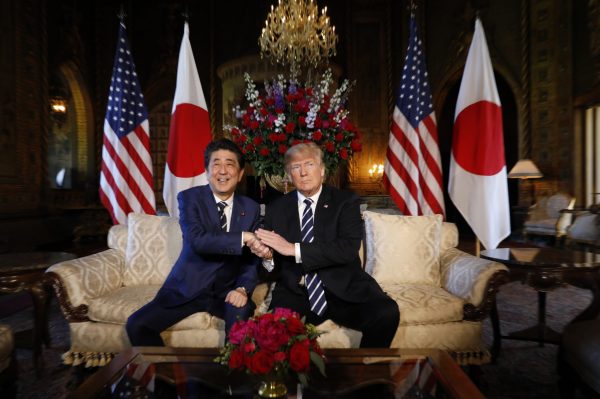What is Kim’s intent? And what could be the outcome of such a meeting?
Despite questions like these swirling around the world, South Korean President Moon Jae-in also announced he would meet with the North Korean leader in April. Japan’s government was caught off guard. For Japanese Prime Minister Shinzo Abe, Kim’s diplomatic offensive and Trump’s favourable response to it were puzzling. To avoid being left behind, Abe arranged a summit with Trump and the two met at Trump’s Mar-a-Lago resort in Florida on 17–18 April.
In addition to the North Korean nuclear and missile issue, Abe and Trump discussed bilateral trade relations and North Korea’s abduction of Japanese citizens in the 1970s and 1980s.
The Trump administration recently announced it was going to impose a 25 per cent tariff on steel and a 10 per cent tariff on aluminium imports as part of its effort to reduce its trade imbalance with key trading partners. China was the most important target of this unilateral move, but Japan was deeply concerned that it, unlike other close allies and trade partners of the United States, did not receive an exemption. The abduction issue has also been very important to Abe, not only as a human rights issue but as a political issue — it has helped Abe and his supporters mobilise anti-North Korean sentiment in Japan and internationally.
Trump pledged to continue a campaign of ‘maximum pressure’ to achieve North Korean denuclearisation in a ‘complete, verifiable and irreversible way’ and also promised that his government would do everything possible to help bring Japanese abductees home. Both sides also agreed to expedite and expand US weapons exports to Japan to reduce the bilateral trade imbalance and to help Japan beef up its defences against North Korean threats.
Abe succeeded in persuading Trump that if a US–North Korean summit materialises, the president should discuss not only disarmament of North Korea’s nuclear weapons and long-range ballistic missiles but also its short- and medium-range missiles that can reach Japanese targets.
Trump revealed that CIA Director and secretary of state nominee Mike Pompeo met with Kim Jong-un in Pyongyang and that the two sides established a ‘good relationship’. Kim subsequently declared that his country was ready for denuclearisation, that it would close down the Punggye-ri nuclear test site and cease all missile tests.
In the press conference following the Trump–Abe summit, the US president stated that if he did not expect a fruitful outcome, he would not attend a summit with Kim. In the same breath, Trump stated his appreciation for Chinese President Xi Jinping’s efforts to curb the North Korean threat. He emphasised that Chinese and US sanctions were having an effect on the situation. Trump did not mention Japan’s sanctions at all.
At the summit, Abe reiterated the importance of the Comprehensive and Progressive Agreement for Trans-Pacific Partnership, still hoping that the United States would rejoin the multilateral trade pact. Trump reportedly disagreed and spoke about his determination to pursue bilateral trade negotiations instead. The two sides did agree to intensify bilateral trade and investment consultations. Abe emphasised Japan’s efforts to expand both imports from and investment in the United States.
These quick-paced diplomatic declarations are a welcome development for prospects on the Korean Peninsula, and clearly preferable to the continued uncertainty and volatility associated with a nuclear North Korea. Any reduction in tension on the Peninsula has important implications for Japan. Most immediately, the outcome of the summit between South Korean President Moon and Kim Jong-un on 27 April and a potential Kim–Trump meeting in the coming months are of utmost interest to Japan. An Abe–Kim summit is also being considered in Tokyo and Pyongyang.
Back home, Abe faces a mounting challenge to his leadership. A series of scandals — one implicating Abe’s wife, allegations of favouritism involving a former aide to the prime minister, possible document tampering and the cover-up of activity logs of a past Self-Defense Forces mission to Iraq — have caused the Abe cabinet’s public approval rating to plummet to 37 per cent, the second-lowest level since the start of Abe’s second stint as prime minister in December 2012.
The heavy fog of uncertainty and rhetoric shrouding the summits on North Korea prevents observers from forecasting their outcome with any degree of confidence. But one thing is certain: the mixed results of the Abe–Trump meeting did very little to divert Japan’s attention away from the domestic scandals plaguing Abe’s leadership, despite the blue sky under which the Japanese and US leaders played golf.
Tsuneo Akaha is Professor at the Middlebury Institute of International Studies at Monterey.

